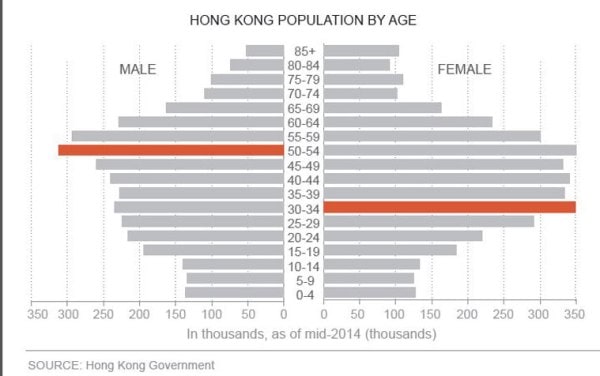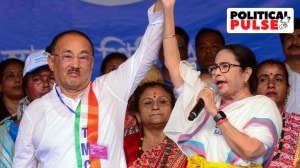- India
- International
Hong Kong protest talks show a wide gap between students, Beijing-backed government
The students passionately explained why they had taken to the streets for more than three weeks to fight for greater democracy.
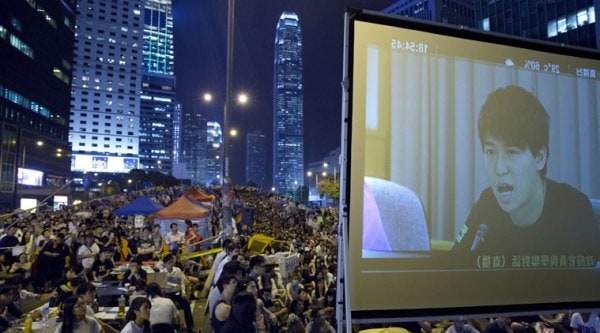 Pro-democracy protesters watch a live TV showing talks between Hong Kong government officials and students at an occupied area outside the government headquarters in Hong Kong’s Admiralty district,Tuesday, Oct. 21, 2014. (Source: AP)
Pro-democracy protesters watch a live TV showing talks between Hong Kong government officials and students at an occupied area outside the government headquarters in Hong Kong’s Admiralty district,Tuesday, Oct. 21, 2014. (Source: AP)
On one side of the table sat the idealistic and earnest young students in jeans and black T-shirts, knapsacks by their sides. Facing them was the line-up of seasoned government officials in their formal suits.
In an unprecedented two-hour televised meeting Tuesday, the students passionately explained why they had taken to the streets for more than three weeks to fight for greater democracy in the specially-run Chinese region. The officials responded that the students’ demands were not legally feasible.
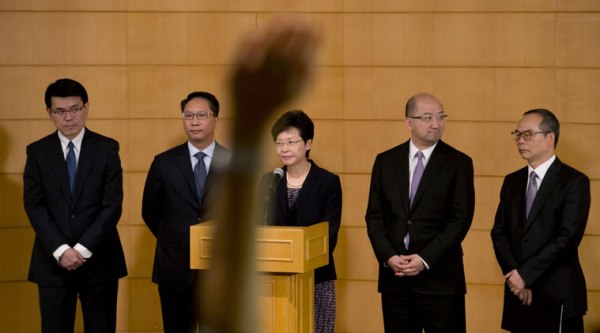 A reporter raises a hand to cast a question as Hong Kong government officials, from right, Undersecretary of the Constitutional and Mainland Affairs Bureau Lau Kong-wah, Secretary for Constitutional and Mainland Affairs Raymond Tam, Chief Secretary for Administration Carrie Lam, Secretary for Justice Rimsky Yuen and Chief Executive’s Office Director Edward Yau Tang-wah attend a news conference after their talks on constitutional development with the student leaders in Hong Kong Tuesday, Oct. 21, 2014. (Source: AP)
A reporter raises a hand to cast a question as Hong Kong government officials, from right, Undersecretary of the Constitutional and Mainland Affairs Bureau Lau Kong-wah, Secretary for Constitutional and Mainland Affairs Raymond Tam, Chief Secretary for Administration Carrie Lam, Secretary for Justice Rimsky Yuen and Chief Executive’s Office Director Edward Yau Tang-wah attend a news conference after their talks on constitutional development with the student leaders in Hong Kong Tuesday, Oct. 21, 2014. (Source: AP)
The discussion yielded scant progress, and protesters remained camped out on streets in three busy districts of the Asian financial hub on Wednesday.
READ: Hong Kong protests intensify as protesters plan to push their case with Beijing-backed govt
The meeting also highlights the vast generational and political divide that needs to be bridged to end Hong Kong’s biggest political crisis since China took control of the city 17 years ago.

The student-led protests are rooted in growing discontent among young people about poor economic prospects amid one of the world’s biggest wealth gaps. The protesters want Hong Kong’s government to abandon a requirement by China’s legislature for a committee to screen candidates for inaugural 2017 elections for the top leader. They say it gives the city’s pro-Beijing elite too much say.
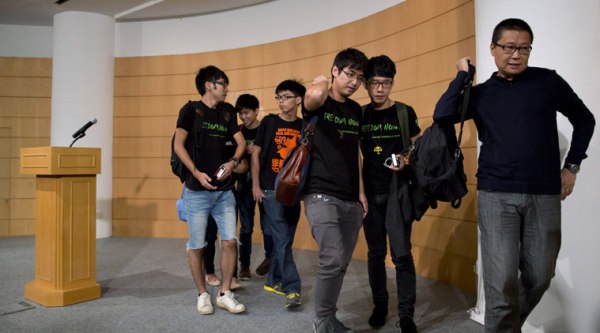 Occupy Central civil disobedience movement founder Chan Kin-man, right, and student leaders from second right, Nathan Law, Alex Chow, Joshua Wong, Lester Shum and Eason Chung, leave the news conference after their talks with the Hong Kong government officials in Hong Kong Tuesday, Oct. 21, 2014. (Source: AP)
Occupy Central civil disobedience movement founder Chan Kin-man, right, and student leaders from second right, Nathan Law, Alex Chow, Joshua Wong, Lester Shum and Eason Chung, leave the news conference after their talks with the Hong Kong government officials in Hong Kong Tuesday, Oct. 21, 2014. (Source: AP)
President Xi Jinping, who has taken a hard-line approach to dissent in other Chinese regions, is unlikely to give any ground.
As student leaders considered whether to meet officials again, protesters vowed to keep occupying the protest zones despite three court injunctions granted this week to taxi and minibus operators and the owner of an office tower ordering them to leave.
Cheung Kuen, a retired 55-year-old stock trader who watched the entire meeting, said there were no winners.
“The students have their rights, and the government has its problems,” Cheung said. “Nothing has changed. The government side already gave some proposals, which were not very deep. The students and society already know them. Hong Kong is only a region and can’t do any more so now it’s about who has more patience.”
He said he agreed with the students’ reform proposals calling for open nominations for candidates in the city’s 2017 election, but he didn’t see any chance of them becoming a reality.
Apr 25: Latest News
- 01
- 02
- 03
- 04
- 05


